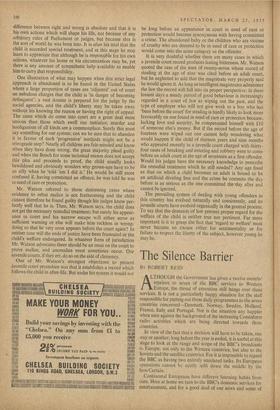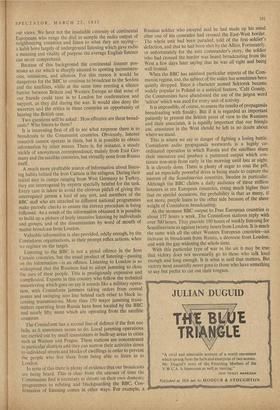The Silence Barrier
ALTHOUGH the Government' has given a twelve months' reprieve to seven of the BBC services to Western Europe, the threat of execution still hangs over these services. It is not a particularly happy situation for the staff responsible for putting out these daily programmes to the seven countries concerned—Denmark, Norway, Sweden, Holland. France, Italy and Portugal. Nor is the situation any happier when seen against the background of the increasing Cominform radio activities which are being directed towards those countries.
In view of the fact that a decision will have to be taken, one way or another, long before the year is ended, it is useful at this stage to look at the range and scope of the BBC's broadcasts to Eurqpe; not only to the Western aountries, but also to the Soviets and the satellite countries. For it is impossible to regard the BBC as having two entirely unrelated tasks. Its European operations cannot be neatly split down the middle by the Iron Curtain. our views. We have not the insatiable curiosity of continental Europeans who range the dial to sample the radio output of neighbouring countries and listen to what they are saying— a habit born largely of underground listening which gave radio. a meaning and vitality of purpose the average English listener can never comprehend.
Because of this background the continental listener pos- sesses an ear which is sharply attuned to spotting inconsisten- cies, omissions, and silences. For this reason it would be dangerous for the BBC to continue to broadcast to the Soviets and the satellites, while at the same time erecting a silence barrier between Britain and Western Europe so that none of our friends could tune in to London for confirmation and support, as they did during the war. It would also deny the waverers and the critics in those countries an opportunity of hearing the British case.
Two questions will be asked : How effective are these broad- casts? Who listens to them?
It is interesting first of all to see' what response there is to broadcasts to the Communist countries. Obviously, listener research cannot operate in them, but it is possible to obtain information by other means. There is, for instance, a steady trickle of anonymous correspondence, mainly from East Ger- many and the satellite countries, but virtually none from Russia itself.
A much more profitable source of information about listen- ing habits behind the Iron Curtain is the refugees. During"their initial stay in camps ranging from West Germany to Turkey, they are interrogated by experts specially briefed for the task. Every care is taken to avoid the obvious pitfall of giving the interrogated person a lead of any sort, and members of the BBC staff who are attached to different national programmes make periodic checks to ensure the Correct procedure is being followed. As a result of the information obtained it is possible to build up a picture of fairly intensive listening by individuals and groups, and of the dissemination by word of mouth of matter broadcast from London. Russian soldier who escaped said he had made up his mind after one of his comrades had crossed the East-West border.
The whole unit had been paraded, told of the first-soldier's defection, and that he had been shot by the Allies. Fortunately, or unfortunately for the unit commander's story, the soldier who had crossed the border was heard broadcasting from the West a few days later saying that he was all right and being well treated.
When the BBC has satirised particular aspects of the Com- munist regime, too, the subject of the satire has sometimes been quietly dropped. Since a character named Sektorek became widely popular in Poland in a satirical feature, 'Café Gossip, the Communists have abandoned the use of the jargon word `sektor' which was used for every unit of activity.
It is impossible, of course, to assess the results of propaganda broadcasting with finality. But if it is regarded as important patiently to present the British point of view to the Russians and their associates, it is equally important that our friends anc: associates in the West should be left in no doubt about where we stand.
This is where we are in danger of fighting a losing battle. Cominform radio propaganda westwards is a highly co- ordinated operation in which Russia and the satellites share their resources and produce a patterned output which con- tinues non-stop from early in the morning until late at night.
It is cleverly done. There is plenty of sugar to coat the pill, and an especially powerful drive is being made to capture the interest of the Scandinavian countries, Sweden in particular.
Although the BBC claims a daily audience of three million listeners in ten European countries, rising much higher than that on special occasions, the probability is that as many, if not more, people listen to the other side because of the sheer weight of Cominform broadcasting.
At the moment BBC output to Free European countries is about 177 hours a week. The Cominform stations reply with over 700 hours. They provide 100 hours of weekly listening for Scandinavians as against twenty hours from London. It is much the same with all the other Western European countries-4n increase in broadcasts from Russia, a decrease from London, and with the gap widening the whole time.
With this particular type of war in the air it may be true that victory does not necessarily go to those who talk loud enough and long enough. It is what is said that matters. But victory most assuredly never goes to those who have something to say but prefer to cut out their tongues.



































 Previous page
Previous page